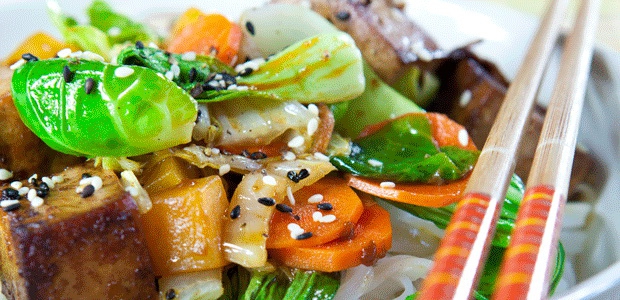Advertisement
Meatless Monday: Meat Consumption Dropping
Americans are eating less meat, including beef, poultry, and pork, according to data from the US Department of Agriculture. The data shows that individual meat consumption in the US has dropped from 184 lbs (83 kg) to 171 lbs (78 kg) annually between 2004 and 2011. It is projected that consumption will drop even more, … Continued

Americans are eating less meat, including beef, poultry, and pork, according to data from the US Department of Agriculture.
The data shows that individual meat consumption in the US has dropped from 184 lbs (83 kg) to 171 lbs (78 kg) annually between 2004 and 2011. It is projected that consumption will drop even more, to 166 lbs (75 kg) by the end of 2012. This drop will represent the lowest level of meat consumption in more than a decade. Although data this recent is not available for Canada, Agriculture and Agri-Food Canada predicts that beef consumption will fall and pork consumption will remain flat between now and 2020.
Several factors are thought to contribute to this drop, including higher food prices and a struggling economy. Further, public opinion about meat consumption is shifting, as people are recognizing the health and environmental benefits of eating less meat.
Benefits of eating less meat
Eating fewer meat and animal products directly affects our health, and indirectly affects the health of the planet.
By cutting our meat and animal product consumption we are greatly reducing our intake of saturated fats, which have been shown to raise LDL (bad) cholesterol, increasing our risk of heart disease. Further, recent research cites red meat as a contributor to colorectal cancer.
Reducing our meat intake can also benefit the planet, as livestock create more greenhouse emissions than all transportation combined. By choosing to eat less meat, we are impacting the supply and demand model that big food businesses are based on. In addition, livestock production contributes to land and water degradation, whereas sustainable, organic vegetable farming aims to maintain soil and water resources.
This Monday (and every Monday hereafter) why not pledge to go meatless? Give the following recipe by Timothy Hennessy a try, and see what you’re (not) missing out on!
Tofu Stir-fry with Sriracha Chili Marinade
If packaged pressed tofu is unavailable, make your own. Place firm tofu on a plate, putting another plate on top of the tofu. Place a heavy, stable object (such as a can of food) on top of the upper plate. Let sit for 15 minutes so excess liquid in the tofu is “pressed” out onto the bottom plate.
Marinade
1 – 12 oz (325 g) package pressed firm tofu, drained
2 Tbsp (30 mL) low-sodium tamari sauce
1 Tbsp (15 mL) Sriracha chili sauce
1 Tbsp (15 mL) sesame oil
1 in (2.5 cm) piece of fresh ginger, peeled and chopped coarsely
Stir-fry
2 Tbsp (30 mL) organic peanut oil
4 heads baby bok choy, base trimmed off, leaves washed, and chopped
1/2 head napa cabbage, root end cut off, washed, and thinly sliced
1 cup (250 mL) butternut squash, peeled and cut into 1/2 in (1.25 cm) pieces
1 cup (250 mL) Brussels sprouts, quartered
1 cup (250 mL) carrots, cut into thin rounds
1/2 cup (125 mL) water
2 Tbsp (30 mL) hoisin sauce
1 Tbsp (15 mL) umeboshi plum vinegar
Cut tofu into 1 in (2.5 cm) pieces and place in shallow dish in a single layer. Combine marinade ingredients and pour over tofu. Let sit for 10 to 15 minutes.
Warm wok over medium-high heat and add 1 Tbsp (15 mL) oil. Cook, stirring constantly, for 4 to 5 minutes, until tofu is slightly crisp and browned. Remove to dish and pour remaining marinade from wok over top.
Wipe out wok with clean, absorbent cloth, reheat, and add remaining 1 Tbsp (15 mL) oil. Add vegetables and stir to coat. Add water, bring to a boil, cover, and reduce heat.
Steam for 4 to 5 minutes, then uncover and test vegetables for desired doneness; they should be tender-crisp. If necessary, cover and steam for another minute.
When vegetables are done, increase heat, add hoisin sauce and umeboshi, and stir to combine. Add tofu and remaining marinade, stir to reheat for 1 to 2 minutes, and serve.
Asian noodles such as rice vermicelli provide a great side dish.
Makes 4 servings.
Each serving contains: 277 calories; 16 g protein; 18 g total fat (3 g sat. fat, 0 g trans fat); 19 g carbohydrates; 5 g fibre; 346 mg sodium





